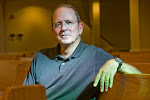In a recent book entitled Substitute: Going to School with a Thousand Kids, Nicholas Baker tries substitute teaching to see just what it is like to teach kids. Here is one of his observations:
"Life's curriculum is infinite. Most of the interesting things we know we can't explain. Most
of what we need to know we were not taught."
So if life's curriculum is infinite what is it we need to learn these days? After listening and looking with amazement at the rhetoric being used in the latest political "race," I sure wish the race was over and quick. What I can't understand and need some learning to happen is just how so many people in our country are taken in by what columnist David Brooks calls the language and mindset of "reaction."
Reactionaries believe that "once there was a golden age, when people knew their place and lived in harmony...but that the golden age was betrayed by elites...only those who have preserved the old ways see what is happening. Only reactionaries have the wisdom to turn things back to the way they used to be, to Make American Great Again."
Brooks goes on to state that "the more serious problem is today's pervasive and self-reinforcing pessimism which feeds the reactionary impulse." So what narrative will we chose to believe as we continue to learn how to live? Brooks suggests that one choice is one that presents a view he calls "moderate religiosity; a belief that God is ultimately in control, that all things are ultimately fashioned toward the good and that arc of history bends toward justice."
Another view he calls humanism, "the belief that people are learning more and more, inventing more and more, and so history is a steady accumulation of good things." Then Brooks shares a learning that I did not want to learn: "As humanism and moderate religion have withered, gloom has pervaded the national mind...so that...even if living standards rise and the poverty rates fall," it does not change the view that "self doubt is the pervasive world view."
So what do we need to learn? How about if we learn that the common good is the base of community and not obsessive individualism that fears that someone is going to take from me what is "mine." "Don't tread on me," may be part of our collective history but it can lead to anger and mistrust of most everybody.
In a his book entitled The End of White Christian America, Robert Jones writes that what is really happening in our country is that a large part our population is experiencing extreme grief over the loss of a cultural world laced with nostalgia. I know enough about grief to know that it includes bargaining, anger, denial, and sadness.
So as a country are we going to go ahead and grieve and then step toward a new phase of life or are we going to put the past ahead of us instead of putting it in its proper place behind us? Putting the past ahead means that any future hope is blocked.
I like what David Brooks suggests which is true conservatism. He states that, "the conservative looks fondly to the past not as a paradise to return to but as a treasure trove of experience to borrow from. The conservative seeks to revive, restore, and reconstruct---to use the gifts of the dead to make the present a little sweeter and deeper." He then calls for this to be combined with a blending of" past cultural and spiritual wisdom and technological advance"
So how smart will we be if we learn the right lessons? I learned from my grandmother, who possessed a 7th grade education, that there is a difference between being smart and being wise. I had a lot more education than she would ever have but she was much more wise than I was. She is the one who first told me that some things are "too high" to be understood completely. " Most of the interesting things we know we can't explain. Most of what we need to know we were not taught."
So here is what I can't explain but find most interesting: Life is a gift not a commodity. We were not ordered from a catalogue. We have divinity in us and we need to look at each other as containers of the divine not as categories such as immigrant or alien. We need to re-learn why we are on this tiny speck of dust. We are not here to accumulate things but to help the Divine One who started it all do what is known as Ticcum Olam, which means to heal the world.
Life is too special to live it with too much grief. Ticcum Olam; that is what I have learned.
Subscribe to:
Post Comments (Atom)


No comments:
Post a Comment